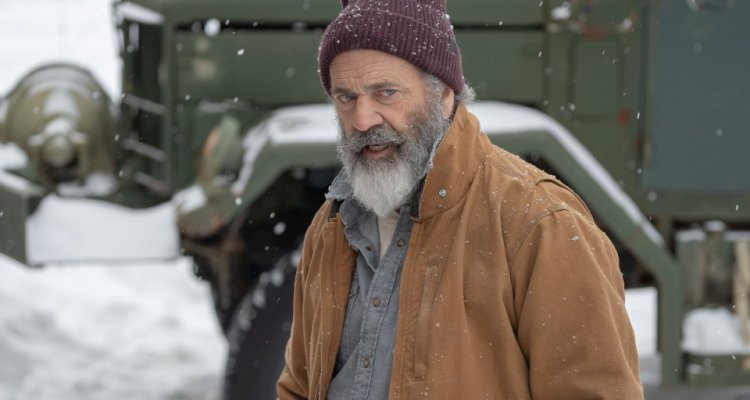“Fatman,” the “Santa Claus versus contract killer” action-comedy-fantasy movie from brothers Eshom and Ian Nelms, dares to wonder just how in the hell Saint Nicholas can afford to produce enough toys to reward every child in the world for good behavior? No one cares about the logistics of his once-a-year globe-trot; it’s magic. But in “Fatman,” rather than a portly and jovial old wizard, Santa’s a worn-down sodbuster working his fingers to the bone to keep the doors open on his workshop at a moment where more kids end up on the naughty list than ever, and his government subsidy doesn’t cover annual shortfalls. It’s a tough time to be jolly.
Times get tougher when Billy Wenan (Chance Hurstfield) opens up a lump of coal on Christmas morning and swears revenge on Santa by calling in the Skinny Man (Walton Goggins), a hitman with his own vendetta against Father Christmas. Billy’s moneyed, entitled, and accustomed to getting his way; a classmate takes first prize in the school science fair, so he persuades her to surrender the title under threat of torture. Meanwhile, Santa, better known as Chris Cringle (Mel Gibson), is forced to take a contract with the United States military to save his factory and ensure his team of elves stay employed. Teetering on the brink of bankruptcy’s bad enough when there isn’t a stone-faced murderer on your trail.
“Fatman” is an odd duck. The film lives up to the wacky logline without taking it as far as it might’ve; the text is absurd, but the atmosphere’s sober. Watching the former and the latter collide is fascinating more than entertaining, which sounds like mission failure except that “fascinating” suffices for most any picture grounded by a Gibson performance. Everyone’s going to walk into “Fatman” carrying their Gibson baggage, and “Fatman” doesn’t make an apology for his transgressions(“Blood Father”), or articulate his belief in the brotherhood of man (“Hacksaw Ridge”) or even capitalize on his history of racism and antisemitism (“Dragged Across Concrete”). Instead, the movie softens him up in ways none of these movies attempt to, but without sacrificing the grave charisma that’s so intrinsic to his persona.
This is a poetic way of saying that Gibson’s eminently watchable as a gruff, hangdog Santa, flinty on the outside but kindly behind the eyes. Chris treats his elves well. That his only recourse is to have them make control panels for fighter jets genuinely breaks his heart. He’s most human around Ruth Cringle (Marianne Jean-Baptiste), who, having known him for time without measure, understands where his head’s at and what he’s suffering under the hood. Around the military brass and government suits who haunt his doorstep, he’s curt and short, and has no trouble using his Santa powers to read back the CliffNotes of their life’s miseries to them.
Peter Ramsey’s 2012 movie “Rise of the Guardians” imagines Santa as a swashbuckling superhero. Think “Fatman” as the grim ‘n gritty edgelord spin on the concept, the kind of thing fanboys insist on for legitimizing stories about grown men fighting evil in their underoos. Chris has super strength, a healing factor, and knowledge of everybody’s sins. It sounds ridiculous because, well, it is. But “Fatman” cast just the right person to give the faux-mature juvenility a sense of grounding, and opposite him cast just the right person to give the mechanical buttonman out for Chris’ head a sense of black, dry humor. Goggins emotes little, but he makes “little” hilarious, whether he’s ambivalently gunning people down in their sleep or fixing his frizzed-up hair after stuffing himself into a Steve Jobs turtleneck.
The film is structured around the inevitable confrontation between Chris and the Skinny Man, so expectations of a non-stop shoot-‘em-up between Gibson and Goggins will be dashed. But the build-up is actually interesting, in large part because the leads are so compelling; anytime “Fatman” cuts away to Hurstfield, who schemes in his home like he’s Snidely Whiplash’s bratty great-grandson, the momentum halts. Billy, the true villain of the piece, ends up superfluous to its function, which is a mixed blessing. Hurstfield is a fine petulant little shit—which incidentally is his caller ID tag on the Skinny Man’s smartphone—but perhaps unsurprisingly, he’s a blip on the radar next to his elders. At the same time watching a rich prick pay for what he thinks should be his even though he doesn’t deserve it feels relevant to our current political contretemps. Maybe it’s for the best that the Nelms’ deemphasize that dynamic; we could all use a break from dramatized Trumpian temper tantrums.
What “Fatman” could’ve used more of, apart from a pop of color here and there—the film unfolds against snowy backdrops, but that doesn’t mean the palette has to be dismal—is an embrace of its genre influences. Chris’ ultimate Western-style showdown with the Skinny Man hints at a movie that could’ve been, and a touch more of that aesthetic might’ve helped blend “Fatman’s” matter-of-fact B-movie silliness with Western stoic machismo; at the spectrum’s other end, themes about finding optimism and hope in a cynical, commercialized season aren’t half as well-realized as they ought to be, mostly because they’re brought up briefly and hardly addressed after the fact. Hit those two notes harder, and “Fatman” might’ve been a classic. As it stands, Gibson and Goggins carry the show, and the Nelms stick to their stern tone without wavering. Whatever other marks the film misses, at least it has conviction. [C]
“Fatman” arrives in theaters November 13 and on VOD, November 24.

